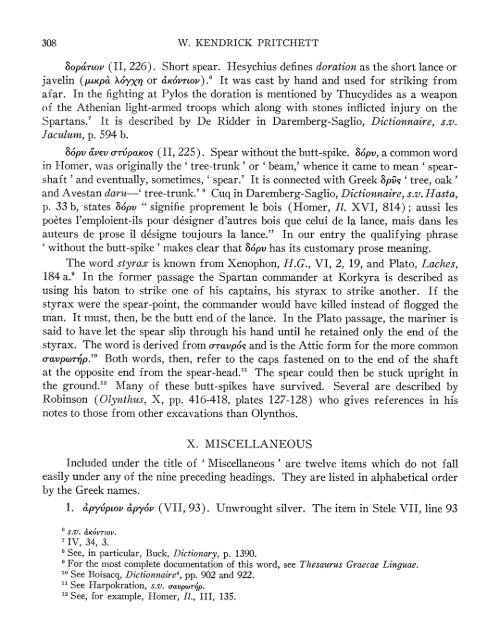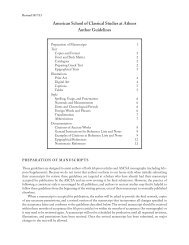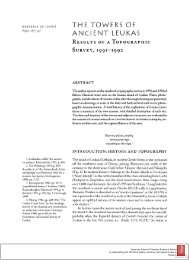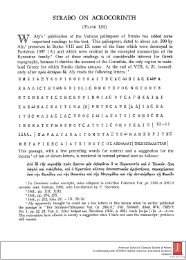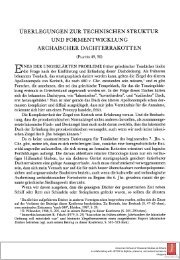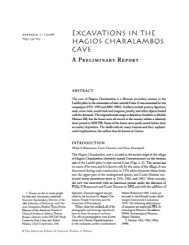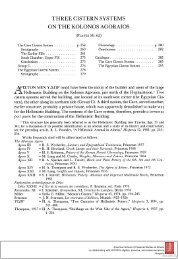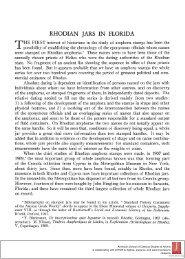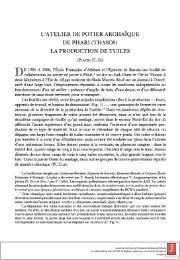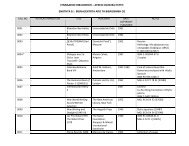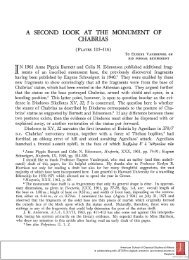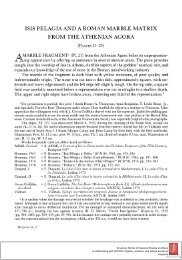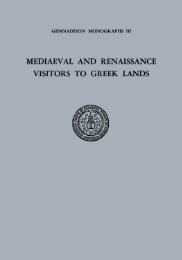the attic stelai - The American School of Classical Studies at Athens
the attic stelai - The American School of Classical Studies at Athens
the attic stelai - The American School of Classical Studies at Athens
Create successful ePaper yourself
Turn your PDF publications into a flip-book with our unique Google optimized e-Paper software.
308 W. KENDRICK PRITCHETT<br />
8opa&nov (II, 226). Short spear. Hesychius defines dor<strong>at</strong>ion as <strong>the</strong> short lance or<br />
javelin (tuKpd AOyX-q or aKovrtov).6 It was cast by hand and used for striking from<br />
afar. In <strong>the</strong> fighting <strong>at</strong> Pylos <strong>the</strong> dor<strong>at</strong>ion is mentioned by Thucydides as a weapon<br />
<strong>of</strong> <strong>the</strong> A<strong>the</strong>nian light-armed troops which along with stones inflicted injury on <strong>the</strong><br />
Spartans! It is described by De Ridder in Daremberg-Saglio, Dictionnaire, s.V.<br />
Jaculum, p. 594 b.<br />
opv a6vEv o-rvpaKos (II, 225). Spear without <strong>the</strong> butt-spike. 86pv, a common word<br />
in Homer, was originally <strong>the</strong> ' tree-trunk ' or ' beam,' whence it came to mnean ' spearshaft<br />
' and eventually, sometimes, ' spear.' It is connected with Greek apvii ' tree, oak'<br />
and Avestan daru-' tree-trunk. 8 Cuq in Daremberg-Saglio, Dictiounaire, s.v. Hasta,<br />
p. 33 b, st<strong>at</strong>es &0pv "signifie proprement le bois (Homer, II. XVI, 814); aussi les<br />
po'tes l'emploient-ils pour d'signer d'autres bois que celui de la lance, mais dans les<br />
auteurs de prose il designe toujours la lance." In our entry <strong>the</strong> qualifying phrase<br />
'without <strong>the</strong> butt-spike ' makes clear th<strong>at</strong> 80pv has its customary prose meaning.<br />
<strong>The</strong> word styrax is known from Xenophon, H.G., VI, 2, 19, and Pl<strong>at</strong>o, Laches,<br />
184 a.9 In <strong>the</strong> former passage <strong>the</strong> Spartan commander <strong>at</strong> Korkyra is described as<br />
using his b<strong>at</strong>on to strike one <strong>of</strong> his captains, his styrax to strike ano<strong>the</strong>r. If <strong>the</strong><br />
styrax were <strong>the</strong> spear-point, <strong>the</strong> commander would have killed instead <strong>of</strong> flogged <strong>the</strong><br />
man. It must, <strong>the</strong>n, be <strong>the</strong> butt end <strong>of</strong> <strong>the</strong> lance. In <strong>the</strong> Pl<strong>at</strong>o passage, <strong>the</strong> mariner is<br />
said to have let <strong>the</strong> spear slip through his hand until he retained only <strong>the</strong> end <strong>of</strong> <strong>the</strong><br />
styrax. <strong>The</strong> word is derived from o-Tavp0s and is <strong>the</strong> Attic form for <strong>the</strong> more common<br />
cavpcv4p.10 Both words, <strong>the</strong>n, refer to <strong>the</strong> caps fastened on to <strong>the</strong> end <strong>of</strong> <strong>the</strong> shaft<br />
<strong>at</strong> <strong>the</strong> opposite end from <strong>the</strong> spear-head.1" <strong>The</strong> spear could <strong>the</strong>n be stuck upright in<br />
<strong>the</strong> ground.12 Many <strong>of</strong> <strong>the</strong>se butt-spikes have survived. Several are described by<br />
Robinson (Olynthus, X, pp. 416-418, pl<strong>at</strong>es 127-128) who gives references in his<br />
notes to those from o<strong>the</strong>r excav<strong>at</strong>ions than Olynthos.<br />
X. MISCELLANEOUS<br />
Included under <strong>the</strong> title <strong>of</strong> 'Miscellaneous ' are twelve items which do not fall<br />
easily under any <strong>of</strong> <strong>the</strong> nine preceding headings. <strong>The</strong>y are listed in alphabetical order<br />
by <strong>the</strong> Greek names.<br />
1. apyiptov apyo,v (VII, 93). Unwrought silver. <strong>The</strong> item in Stele VII, line 93<br />
6S.V.<br />
aKovTtov.<br />
7 IV, 34, 3.<br />
8 See, in particular, Buck, Dictionary, p. 1390.<br />
9 For <strong>the</strong> most complete document<strong>at</strong>ion <strong>of</strong> this word, see <strong>The</strong>saurus Graecae Linguae.<br />
10 See Boisacq, Dictionnaire4, pp. 902 and 922.<br />
1 See Harpokr<strong>at</strong>ion, s.v. aavpwr4p.<br />
12<br />
See, for example, Homer, II., III, 135.


